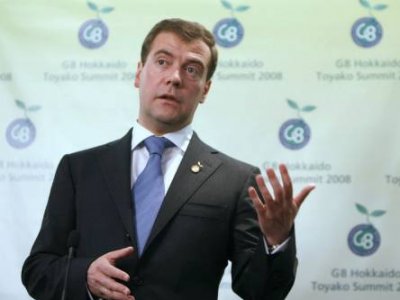 Kremlin is increasingly concerned about possible social turmoil and Medvedev has called for a more flexible political system.
Kremlin is increasingly concerned about possible social turmoil and Medvedev has called for a more flexible political system.
Russian President Dmitry Medvedev invited local lawmakers in unusual remarks on Friday to criticise the government’s handling of the deepening economic crisis.
“It’s clear that discussions are possible and even necessary on issues within your responsibilities, which are first and foremost overcoming the crisis,” Medvedev told a Kremlin meeting with the leaders of 83 regional legislative assemblies.
“There is nothing surprising about you criticising the (government’s) course,” Medvedev added. “Naturally, you should come out with arguments in support of the course if you believe it is correct.”
Medvedev’s remarks contrast with the tone of his mentor, Prime Minister Vladimir Putin, who in his eight years as president built a system where criticism was frowned upon and the ruling party said parliament was not a place for debate.
But with the economic crisis and soaring unemployment, the Kremlin is increasingly concerned about possible social turmoil and Medvedev has called for a more flexible political system.
The Kremlin chief, sworn in as president last May, has proposed giving seats in parliament to small opposition parties which under Putin disappeared from the lower house.
Medvedev said Russian authorities were working in a coordinated way and made a clear jab at Ukraine, saying turmoil in a neighbouring country could lead it to a default.
“We do not have political problems, which is good, because a country which goes through a crisis with political difficulties (has) a high chance of going into a default,” he said.
“Look at what our neighbours are doing. The situation is tough enough but on top of that there is a permanent state of political tension and internal clan war,” he said.
Russia’s regional legislatures are still dominated by Putin’s United Russia party and its allies, but have remained more diverse than the national parliament.
“You represent the full spectrum of political life in modern Russia,” Medvedev told the lawmakers.
Two-thirds of Russia’s 83 regions depend on donations from the federal budget, so analysts say local lawmakers are likely to be the first to face public anger at spending cuts.
Last month the governor of the Siberian region of Krasnoyarsk, Alexander Khloponin, publicly warned that some areas had only few months’ reserves to ensure the most sensitive social spending.
In the chaos of the 1990s, many Communist-dominated local legislatures were strong opponents of the Kremlin’s market reforms and tried to withhold federal taxes from Moscow.
But Medvedev warned local legislators against populism.
“In the current circumstances populism and demagogy are out of place,” he said. “And it is completely impermissible to allow regional parliaments to get involved in lobbying for anyone’s selfish interests.”
 Eurasia Press & News
Eurasia Press & News
